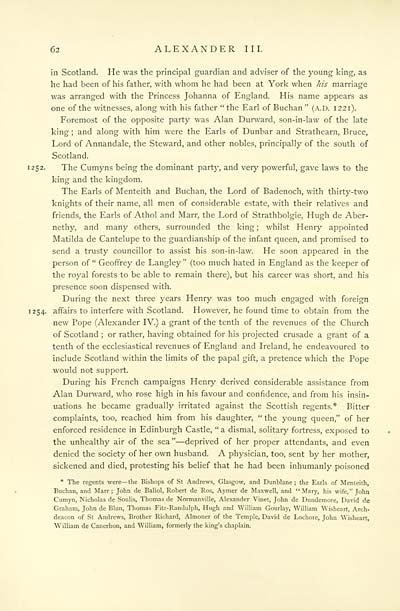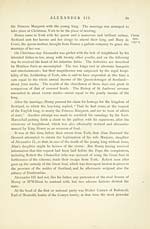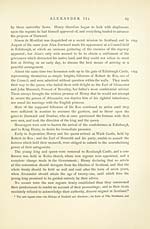Family records of the Bruces and the Cumyns
(74) Page 62
Download files
Complete book:
Individual page:
Thumbnail gallery: Grid view | List view

62 ALEXANDER III.
in Scotland. He was the principal guardian and adviser of the young king, as
he had been of his father, with whom he had been at York when his marriage
was arranged with the Princess Johanna of England. His name appears as
one of the witnesses, along with his father " the Earl of Buchan " (A.D. 1221).
Foremost of the opposite party was Alan Durward, son-in-law of the late
king ; and along with him were the Earls of Dunbar and Strathearn, Bruce,
Lord of Annandale, the Steward, and other nobles, principally of the south of
Scotland.
1252. The Cumyns being the dominant part)', and very powerful, gave laws to the
king and the kingdom.
The Earls of Menteith and Buchan, the Lord of Badenoch, with thirty-two
knights of their name, all men of considerable estate, with their relatives and
friends, the Earls of Athol and Marr, the Lord of Strathbolgie, Hugh de Aber-
nethy, and many others, surrounded the king ; whilst Henry appointed
Matilda de Cantelupe to the guardianship of the infant queen, and promised to
send a trusty councillor to assist his son-in-law. He soon appeared in the
person of " Geoffrey de Langley " (too much hated in England as the keeper of
the royal forests to be able to remain there), but his career was short, and his
presence soon dispensed with.
During the next three years Henry was too much engaged with foreign
1254. affairs to interfere with Scotland. However, he found time to obtain from the
new Pope (Alexander IV.) a grant of the tenth of the revenues of the Church
of Scotland ; or rather, having obtained for his projected crusade a grant of a
tenth of the ecclesiastical revenues of England and Ireland, he endeavoured to
include Scotland within the limits of the papal gift, a pretence which the Pope
would not support.
During his French campaigns Henry derived considerable assistance from
Alan Durward, who rose high in his favour and confidence, and from his insin-
uations he became gradually irritated against the Scottish regents.* Bitter
complaints, too, reached him from his daughter, " the young queen," of her
enforced residence in Edinburgh Castle, "a dismal, solitary fortress, exposed to
the unhealthy air of the sea" — deprived of her proper attendants, and even
denied the society of her own husband. A physician, too, sent by her mother,
sickened and died, protesting his belief that he had been inhumanly poisoned
* The regents were— the Bishops of St Andrews, Glasgow, and Dunblane ; the Earls of Menteith,
Buchan, and Marr; John de Baliol, Robert de Ros, Aymer de Maxwell, and "Mary, his wife," John
Cumyn, Nicholas de Soulis, Thomas de Normanville, Alexander Vinet, John de Dundemore, David de
Graham, John de Blun, Thomas Fitz-Randulph, Hugh and William Gourlay, William Wisheart, Arch-
deacon of St Andrews, Brother Richard, Almoner of the Temple, David de Lochore, John Wisheart,
William de Canerhon, and William, formerly the king's chaplain.
in Scotland. He was the principal guardian and adviser of the young king, as
he had been of his father, with whom he had been at York when his marriage
was arranged with the Princess Johanna of England. His name appears as
one of the witnesses, along with his father " the Earl of Buchan " (A.D. 1221).
Foremost of the opposite party was Alan Durward, son-in-law of the late
king ; and along with him were the Earls of Dunbar and Strathearn, Bruce,
Lord of Annandale, the Steward, and other nobles, principally of the south of
Scotland.
1252. The Cumyns being the dominant part)', and very powerful, gave laws to the
king and the kingdom.
The Earls of Menteith and Buchan, the Lord of Badenoch, with thirty-two
knights of their name, all men of considerable estate, with their relatives and
friends, the Earls of Athol and Marr, the Lord of Strathbolgie, Hugh de Aber-
nethy, and many others, surrounded the king ; whilst Henry appointed
Matilda de Cantelupe to the guardianship of the infant queen, and promised to
send a trusty councillor to assist his son-in-law. He soon appeared in the
person of " Geoffrey de Langley " (too much hated in England as the keeper of
the royal forests to be able to remain there), but his career was short, and his
presence soon dispensed with.
During the next three years Henry was too much engaged with foreign
1254. affairs to interfere with Scotland. However, he found time to obtain from the
new Pope (Alexander IV.) a grant of the tenth of the revenues of the Church
of Scotland ; or rather, having obtained for his projected crusade a grant of a
tenth of the ecclesiastical revenues of England and Ireland, he endeavoured to
include Scotland within the limits of the papal gift, a pretence which the Pope
would not support.
During his French campaigns Henry derived considerable assistance from
Alan Durward, who rose high in his favour and confidence, and from his insin-
uations he became gradually irritated against the Scottish regents.* Bitter
complaints, too, reached him from his daughter, " the young queen," of her
enforced residence in Edinburgh Castle, "a dismal, solitary fortress, exposed to
the unhealthy air of the sea" — deprived of her proper attendants, and even
denied the society of her own husband. A physician, too, sent by her mother,
sickened and died, protesting his belief that he had been inhumanly poisoned
* The regents were— the Bishops of St Andrews, Glasgow, and Dunblane ; the Earls of Menteith,
Buchan, and Marr; John de Baliol, Robert de Ros, Aymer de Maxwell, and "Mary, his wife," John
Cumyn, Nicholas de Soulis, Thomas de Normanville, Alexander Vinet, John de Dundemore, David de
Graham, John de Blun, Thomas Fitz-Randulph, Hugh and William Gourlay, William Wisheart, Arch-
deacon of St Andrews, Brother Richard, Almoner of the Temple, David de Lochore, John Wisheart,
William de Canerhon, and William, formerly the king's chaplain.
Set display mode to:
![]() Universal Viewer |
Universal Viewer | ![]() Mirador |
Large image | Transcription
Mirador |
Large image | Transcription
Images and transcriptions on this page, including medium image downloads, may be used under the Creative Commons Attribution 4.0 International Licence unless otherwise stated. ![]()
| Histories of Scottish families > Family records of the Bruces and the Cumyns > (74) Page 62 |
|---|
| Permanent URL | https://digital.nls.uk/95071874 |
|---|
| Description | A selection of almost 400 printed items relating to the history of Scottish families, mostly dating from the 19th and early 20th centuries. Includes memoirs, genealogies and clan histories, with a few produced by emigrant families. The earliest family history goes back to AD 916. |
|---|

